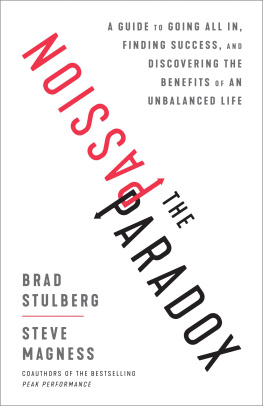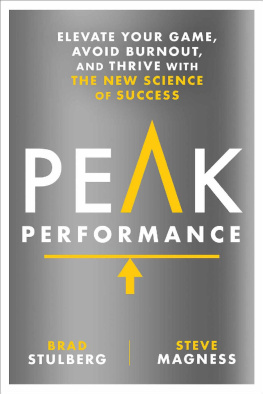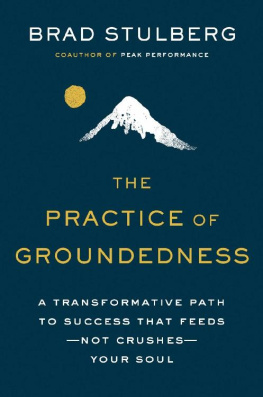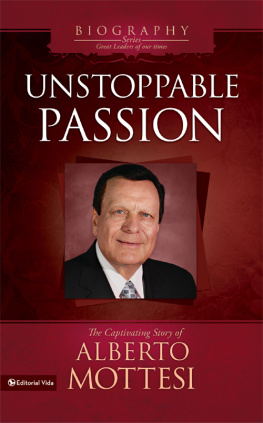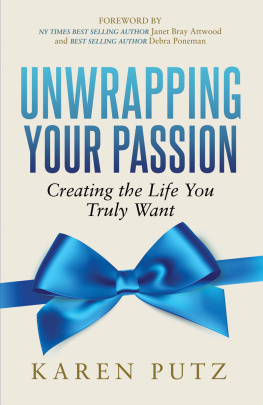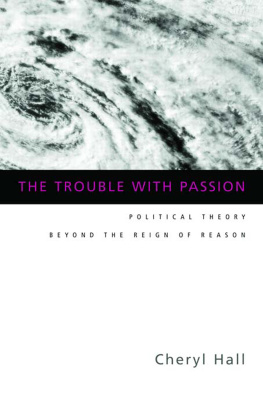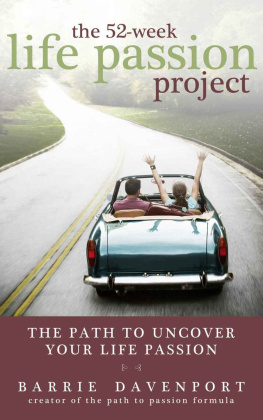Contents
Landmarks
Print Page List
Acknowledgments
Writing this book was another team effortnot only between the two of us, but also between us and so many other individuals who contributed in their own unique ways. If you enjoyed The Passion Paradox , please join us in a moment of thanks for the following people:
First and foremost, we want to thank our core team, who continue to support our work and take it to the next level. To Caitlin Stulberg, who once again showed that she is not just an unbelievable wife to one of us, but also an unbelievable editor to both of us. Nearly every page of this bookand one of its authorsis better because of her.
To our agent, Ted Weinstein, who continues to push our thinking and who is never shy about telling us what he thinkswhich is exactly what you want in an agent.
To our acquiring editor, Mark Weinstein, who began encouraging us to write this book less than a week after he published our first one. He believed in the concept from the get-go, and he also believed in us.
And to our current editor, Donna Loffredo. Shortly after we had completed our first draft of the manuscript, our old publisher was sold to the Crown Publishing Group at Penguin Random House. To be completely honest, we had no clue what would happen or what to expect. Well, what happened was this: Donna made the book her own and she exceeded all of our expectations. She took our initial draft and pushed the concept (and the writing) even further. The result is a richer, more elegant, and more insightful book. Donna, youve become the perfect partner. Were so fortunate that the universe put this book and us as authors into your hands. In addition to Donna, wed also like to thank the whole team at Crown. Brianne Sperber, Connie Capone, and Shauna Barry led a strong charge to ensure this book would reach as many readers as possible. Ivy McFadden and Alisa Garrison caught all our grammatical errors and made the copy shine.
We also want to thank the readers of our early drafts; your feedback improved this book immensely. Thank you to Zack Bloom, Emily Magness, Hillary Montgomery, Alan McClain, Andy Stover, and Brian Barraza.
And wed like to thank our mentors and close friends, who encouraged us to write this book and whose collective impression on us over the years shaped its message. We are fortunate to have lifelong teachers, and we are blessed to be surrounded by a circle of wisdom, kindness, and caring. A special thanks to Justin Bosley, David Epstein, Mario Fraioli, Vern Gambetta, Adam Grant, Bruce Grierson, Michaela Hoffman, Alex Hutchinson, Jon Marcus, Danny Mackey, Mike Joyner, Bob Kocher, Kelly McGonigal, Rich Roll, and Melissa Stern.
Thanks are also in order to the publications to which we regularly contribute, including Outside magazine (in particular, Brads editors Wesley Judd and Matt Skenazy) and New York magazine (in particular, Brads editor Melissa Dahl) . Some of the stories and insights in this book first appeared in Brads columns in both Outside and New York . Its truly an honor to write regularly for such first-rate publications.
And of course, thanks to all the passionate people whose stories we shared in this book and who have helped us come to realize everything that we wrote. While there are far too many to name, we want to call out all of Steves athletes and Brads coaching clients, whom we are privileged to work with on this stuff every day.
Finally, thanks to the members of our families, who have always supported us in pursuing our own passions. Without them, none of this would be possible. Caitlin Stulberg, Linda and Bob Stulberg, Eric Stulberg, Lois Stulberg, Bob and Elaine Appel, Randee and Bob Bloom, William and Elizabeth Magness, Phillip and Emily Magness: Thank you.
About the Authors
Brad Stulberg coaches, researches, writes, and speaks on health and human performance. His coaching practice includes working with athletes, entrepreneurs, and executives on their performance and well-being. He is a columnist at Outside and has written for the New York Times, New York magazine , Sports Illustrated, Wired, Forbes, and the Los Angeles Times . Previously, Stulberg worked as a consultant for McKinsey & Company, where he counseled some of the worlds top executives on a broad range of issues. An avid athlete and outdoor enthusiast, Stulberg lives in Oakland, California, with his wife, son, and two cats. Follow him on Twitter @BStulberg.
Steve Magness coaches some of the top distance runners in the world and has propelled numerous athletes to Olympic trials, world championship teams, and the Olympics. Known widely for his integration of science and practice, Steve has been on the forefront of innovation in sport. He has been a featured expert in Runners World , the New York Times , the New Yorker , BBC, the Wall Street Journal , and ESPN The Magazine . His first book, The Science of Running , was published in 2014. He lives in Houston, Texas. Follow him on Twitter @SteveMagness.
CONCLUSION
Living Productively with Passion
Commencement addresses and motivational speeches arent likely to change anytime soon. Finding, following, and living with passion will remain common refrains. Whether this is a positive thing depends largely on who is receiving the message and how it is received. Mindlessly living with a passion can be extremely harmful and destructive. Mindfully living with a passion can be the key to a life well lived. Above all, this is the conclusion we came to after researching, reporting, and writing this book.
Mindlessly living with a passion can be extremely harmful and destructive. Mindfully living with a passion can be the key to a life well lived.
Mindfully living with a passion starts with realizing that passion in and of itself doesnt start off as either good or bad; it just is a powerful emotion rooted in our biology and psychology. Its not something we magically find, but something that we develop by following our interests and incrementally devoting more of our time and energy to them. The next step to mindfully living with passion is to become aware of its dark side. Only by understanding the pitfalls of obsessive and fear-driven passionand taking deliberate steps to avoid themdoes passion gain the potential to be productive. But avoiding pitfalls is not enough. An equal challenge is bucking current trends that favor instant gratification and instead actively adopting the mastery mind-set: maintaining drive from within; focusing on the process over results; not worrying about being the best but worrying about being the best at getting better; embracing acute failure for chronic gains; practicing patience; and paying full attention to our pursuits. Cultivating these practices opens the door to harmonious passion, the best kind of passion, and the special kind of Quality it manifests. Even so, it is important to remember that harmony with a passion can still lead to disharmony in other areas of your life. Balance is more often than not an illusion, especially for someone who is wholly absorbed in a passion.
Instead of striving for balance, then, the passionate person should strive to be self-aware. Self-awarenesswhich, paradoxically, comes from distancing yourself from your selfis the only force strong enough to counter passions overwhelming inertia. Self-awareness ensures that you control your passion rather than your passion controlling you. It allows you to honestly evaluate what your passion is costing you, and to choose how to go forward as a result. So long as your passion is harmonious and you are aware of what youre sacrificing to pursue it, then there is no wrong choice. The only wrong choice is losing the ability to consciously make one. Whatever choice you make about how to pursue your passion, about how much of your time and energy it should consume, its critical that you do so as the author of your own story. Although your passion can be an integral part of that story, it should never be the entire thing. It is imperative that you write chapters that build upon and branch out from your passionyour life may very well depend on it.

